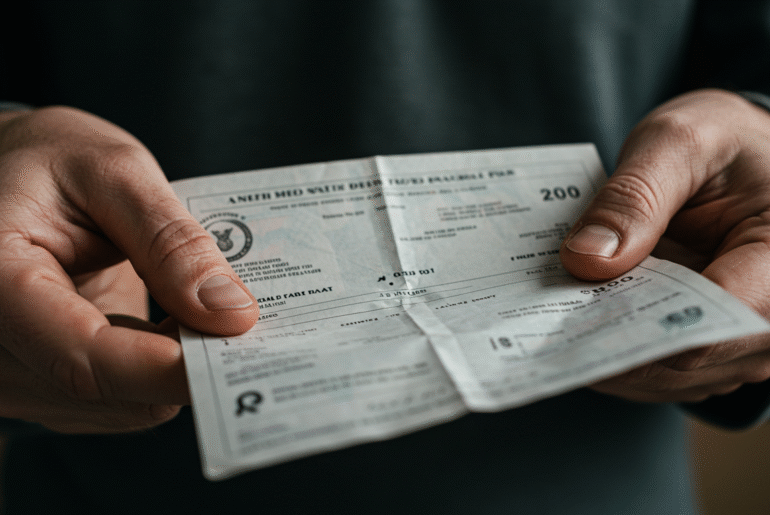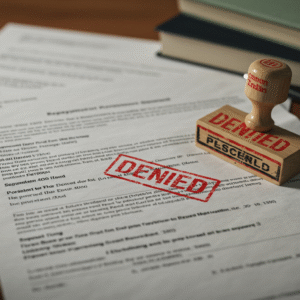This article may contain references to products or services from one or more of our advertisers or partners. We may receive compensation when you click on links to those products or services. Nonetheless, our opinions are our own.
The information presented in this article is accurate to the best of our knowledge at the time of publication. However, information is subject to change, and no guarantees are made about the continued accuracy or completeness of this content after its publication date.
It’s not always easy to manage money, and many people spend more than they make without even realizing it. If you live beyond your means, you may end up in debt, stressed out, and financially unstable. But if you spot the signs early, you can get back in control. We’ll talk about ten clear signs that your spending may be higher than your income and gives you useful tips on how to make your financial situation better.
- Signs You’re Living Beyond Your Means
- 1. Living Paycheck to Paycheck
- 2. Carrying High Credit Card Balances
- 3. Fear Checking Your Bank Account
- 4. Skipping Necessary Payments
- 5. Lifestyle Doesn’t Match Income
- 6. No Emergency Fund
- 7. Ignoring Problematic Debt
- 8. Buying Items on Sale Unnecessarily
- 9. Frequent Buyer’s Remorse
- 10. Feeling Stressed About Money
- Conclusion
- Frequently Asked Questions
- Recommended Reads
Signs You’re Living Beyond Your Means
1. Living Paycheck to Paycheck
If you spend most of your money on basic needs and have little left over for savings or extra spending, you might be living paycheck to paycheck. This cycle can make even small costs stressful and leave you unprepared for costs that come up out of the blue. To get back in charge, start by keeping track of all your spending, making a budget, and putting a small amount of money from each paycheck into an emergency fund. Even small savings can add up over time to make a safety net that makes you less worried about money.
2. Carrying High Credit Card Balances
Credit cards can be helpful tools when used responsibly, but carrying balances month to month often indicates that spending exceeds income. High-interest debt grows quickly and can make it harder to achieve financial goals. To address this, focus on paying more than the minimum each month and consider prioritizing higher-interest debts first. This approach helps reduce your overall debt burden and builds financial confidence.
3. Fear Checking Your Bank Account
If you feel anxious or avoid checking your bank account, it could be a sign that your finances are out of control. Regularly monitoring your account balances and tracking your spending can help you understand where your money is going. Setting aside even 10-15 minutes each week for a financial check-in allows you to identify problem areas early and adjust your spending before it becomes overwhelming.
4. Skipping Necessary Payments
Postponing essential bills, such as rent, utilities, or loan payments, is a serious warning that your spending may be unsustainable. Missing payments can result in late fees, penalties, and long-term financial consequences. To prevent this, prioritize necessary expenses and automate payments where possible. Treating your essential bills as non-negotiable ensures that critical needs are met first.
5. Lifestyle Doesn’t Match Income
When your lifestyle consistently exceeds your income, it creates an unsustainable cycle. Overspending on clothing, dining, travel, or luxury items to maintain appearances can lead to debt and financial strain. Evaluating your spending habits honestly and making adjustments to live within your means is essential. Focus on what brings value to your life rather than what impresses others.
6. No Emergency Fund
An emergency fund is vital for handling unexpected expenses, such as car repairs or medical bills. Without it, even minor emergencies can become financial crises. Aim to save at least three to six months’ worth of living expenses, starting small and increasing gradually. Knowing you have a financial cushion can reduce stress and provide peace of mind during unforeseen circumstances.
7. Ignoring Problematic Debt
Debt is common, but ignoring it does not make it disappear. Letting unpaid loans or credit card balances accumulate can worsen your financial situation over time. Develop a repayment plan, focus on high-interest debt first, and consider seeking guidance from a financial advisor if needed. Confronting your debt head-on helps you regain control and reduces long-term financial pressure.
8. Buying Items on Sale Unnecessarily
Many people justify purchases by claiming they are “saving money” on items marked down. However, frequent purchases driven by sales rather than necessity can inflate spending and lead to clutter. Practice mindful spending by only buying items that genuinely fulfill a need. This habit encourages thoughtful budgeting and prevents unnecessary expenses from impacting your financial stability.
9. Frequent Buyer’s Remorse
Feeling regret after making purchases is a strong indicator of overspending. Impulse buying can lead to repeated feelings of dissatisfaction and financial stress. To avoid this, pause before making non-essential purchases, give yourself a 24-hour waiting period, and evaluate whether the item is truly necessary. This approach encourages responsible spending and promotes better decision-making over time.
10. Feeling Stressed About Money
Persistent stress about finances can affect your health, relationships, and overall quality of life. Feeling constantly overwhelmed by bills or debt signals that changes are necessary. Implementing budgeting strategies, reducing unnecessary expenses, and seeking advice from a financial expert can help relieve stress. Taking proactive steps allows you to regain control and cultivate a sense of financial security.
Voted "Best Overall Budgeting App" by Forbes and WSJ
Monarch Money helps you budget, track spending, set goals, and plan your financial future—all in one app.
Get 50% OFF your first year with code MONARCHVIP
Conclusion
The first step to getting your finances back on track is to be able to spot the signs that you are living beyond your means. You can achieve financial stability and peace of mind by making a budget, cutting back on unnecessary spending, dealing with debt, and building an emergency fund. You can live comfortably without worrying about money by making small, consistent changes that last. Taking action today will help you build a safe and confident financial future.
Frequently Asked Questions
What does it mean to live beyond your means?
Living beyond your means means spending more money than you make, which can lead to debt and stress about money. To avoid this situation, you need to be responsible with your money and your spending.
How can I tell if I’m overspending?
Common signs include frequent reliance on credit cards, stress when paying bills, missed payments, and minimal savings. Monitoring your spending habits can help identify if your expenses exceed your income.
Can lifestyle inflation contribute to overspending?
Yes. As your income grows, increasing spending without budgeting can lead to living beyond your means. It is important to adjust spending in line with financial goals.
What steps can I take to regain financial control?
Create a clear budget, track your expenses, prioritize saving, reduce unnecessary purchases, and seek guidance from financial professionals if needed. Taking consistent action can help restore stability.
Are emergency funds really necessary?
Emergency funds are essential for handling unexpected expenses without relying on credit cards or loans. Building a financial cushion reduces stress and provides a safety net during unforeseen events.

Reviewed and edited by Albert Fang.
See a typo or want to suggest an edit/revision to the content? Use the contact us form to provide feedback.
At FangWallet, we value editorial integrity and open collaboration in curating quality content for readers to enjoy. Much appreciated for the assist.
Did you like our article and find it insightful? We encourage sharing the article link with family and friends to benefit as well - better yet, sharing on social media. Thank you for the support! 🍉
Article Title: 10 Signs You’re Living Beyond Your Means
https://fangwallet.com/2025/08/29/10-signs-youre-living-beyond-your-means/The FangWallet Promise
FangWallet is an editorially independent resource - founded on breaking down challenging financial concepts for anyone to understand since 2014. While we adhere to editorial integrity, note that this post may contain references to products from our partners.
The FangWallet promise is always to have your best interest in mind and be transparent and honest about the financial picture.
Become an Insider

Subscribe to get a free daily budget planner printable to help get your money on track!
Make passive money the right way. No spam.
Editorial Disclaimer: The editorial content on this page is not provided by any of the companies mentioned. The opinions expressed here are the author's alone.
The content of this website is for informational purposes only and does not represent investment advice, or an offer or solicitation to buy or sell any security, investment, or product. Investors are encouraged to do their own due diligence, and, if necessary, consult professional advising before making any investment decisions. Investing involves a high degree of risk, and financial losses may occur including the potential loss of principal.
Source Citation References:
+ Inspo
There are no additional citations or references to note for this article at this time.












































